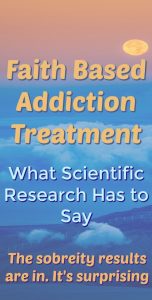As Christ Followers, we find comfort in having spiritual support to recover from alcohol and drug addiction.
For recovery to be successful, it’s important to find a program that provides evidence and spiritual-based support that best matches the unique set of problems, caused by addiction.
Combining faith and recovery is a good thing. Medical research proves this. Studies have shown that participating in religious activities, increases self-esteem, well-being, and a feeling of belonging. A faith-based recovery approach is a great option for those seeking God’s presence.
Adding Jesus to treatment makes for success.
With a combination of traditional drug rehab and a spiritual approach to addiction, faith-based recovery is helpful for those struggling with addiction. It does this while supporting and strengthening our faith. For so many, this combination leads to a better chance of full recovery.
The Philosophy Behind a Faith-Based Recovery Center
We work with programs all across the United States. The good news is that there are a variety of spiritual treatment tools and programs. Most faith-based treatment programs focus on Christian treatment methods. Though every program is a bit different, faith-based recovery programs tend to share a few common techniques and goals.

Commonalities in Faith-Based Addiction Treatment
One common factor is the way that the spiritual and religious elements are presented to those participating in addiction recovery. Most are taught is a loving and positive way. Faith and spiritually based programs, with a focus on providing support and nurturing, have the best outcomes.
Religious Recovery Center – Defined
A religious recovery center is a drug treatment facility that approaches the problem of addiction from a spiritual point of view. The facilitators and clinicians at these facilities believe that a person turns to addictive behavior to try to fill the void left by a lack of spirituality in his or her life.
The theory behind this style of recovery is that adding Jesus Christ or a higher power to the addicts’ life will help fill that void and remove the need for addictive behavior. It’s more than just a theory, however, as we see much success with this type of approach.
While each facility is structured uniquely, many recovery facilities combine the teachings of Christ with traditional non-spiritual recovery methods. This combined approach can work well for those willing to get sober and able to embrace religious teachings. It also works well for people who are questioning how Our Savior is working in their life.
It’s very common for people addicted to drugs and alcohol to believe that they are abandoned by the Holy Spirit. They also can feel that they are not worth fixing. When recovery is treated more with an “open mind” to various religious experiences, it helps a person gain confidence.
Depending on the treatment it may include the following:
- Education on spiritual principles
- Development of a relationship with a higher power
- Participation in religious study, prayer or mediation
- Drug addiction education
- Drug counseling
- Help with detoxing through the withdrawal process
- Group therapy and religious studies
- Relapse prevention training
Christ forgives you and loves you, and is waiting to help you stand strong in recovery.

Most faith-based rehab programs are designed for people who already practice a certain faith. For example, someone who embraces the Christian faith is likely to embrace a Bible-based recovery program.
The goal of a program like this is to help individuals strengthen their relationship with Christ as they seek recovery. People who are not Christians who enroll in one of these programs will find that the staff will be loving and open-minded. They won’t try to force them into any belief, however, they will show by example how faith can help them overcome their addiction.
This should not make someone practicing a different religion uncomfortable, therefore it should enhance and not interfere with their recovery. If you are struggling with addiction and want a faith-based treatment option, it’s a good idea to look for one that is open to embracing all religious beliefs. Many atheists and agnostics have found their way back to a loving God after they get sober.
Though each program is unique, some of the similarities include:
- Believing in God
- Practicing prayer
- Turning one’s will over to a higher power
- Creating a moral inventory of one’s self
- Admitting sins and transgressions to God
- Sharing sins and transgressions with others in the program
- Seeking forgiveness from those one has wronged due to addiction and substance abuse
- Attributing meaning to one’s life experiences
- Educating participants about spiritual principles
- Relying on Biblical principles
- Participating in a faith-based community
- Helping others overcome addiction
- Carrying the message to others suffering from addiction
- Drug addiction education and counseling
- Detox and guided withdrawal process
- Relapse prevention training and techniques
A Spiritual Solution to your Family’s Addiction Problem
One thing that can set a faith-based recovery program apart from other programs is the fact that they often combine addictive behaviors as things that can be cured with the help of treatment combined with religious faith. While drugs and alcohol are the most common addictions treated in recovery, you will commonly get help if you struggle with other types of issues such as the following:
- Depression
- Trauma
- Sexual addictions
- Food addictions or eating disorders
- Gambling addictions
It is almost guaranteed that a drug addict or alcoholic will come into a treatment center with some kind of mental illness. After all, abusing drugs almost certainly will, at the least, cause depression.
Medical conditions are treated as part of the recovery process. Therapists, counselors, and doctors are trained to help with this kind of dual-diagnosis. Because the faith-based recovery center will work to fill the spiritual voids in your life, similar spiritual counseling will also be used to provide support for these addictions.

Other Religious Points of View
Faith-based recovery programs both serve to treat addictions and to strengthen faith. Many Christian and Catholic addiction treatment programs are based on the assumption that the person may turn to drugs and alcohol in order to fill a gap in their life that’s caused by a lack of connection to God. That may or not be true.
Regardless of your belief when you enter the program, you can still get healthy and sober. Having faith is not a requirement for getting better and living a wonderful life. However, if you are suffering from a spiritual malady, this might just be the secret to getting your life back on track.
By adding Jesus Christ, God or a higher power back into your life, a gap can be filled, and the urge toward addictive behavior will be reduced.
Faith and Spiritual beliefs can help treat long-term addiction in three ways:
- Since our spiritual beliefs don’t support addictive drug use, there is a bit of “peer pressure” to stay on the right path.
- Participating in our fellowship fills social voids. This gives us a sense of belonging and acceptance
- A personal connection to God provides a feeling of optimism and strength to resist drugs and alcohol abuse.
SaveSave
SaveSave
SaveSave
